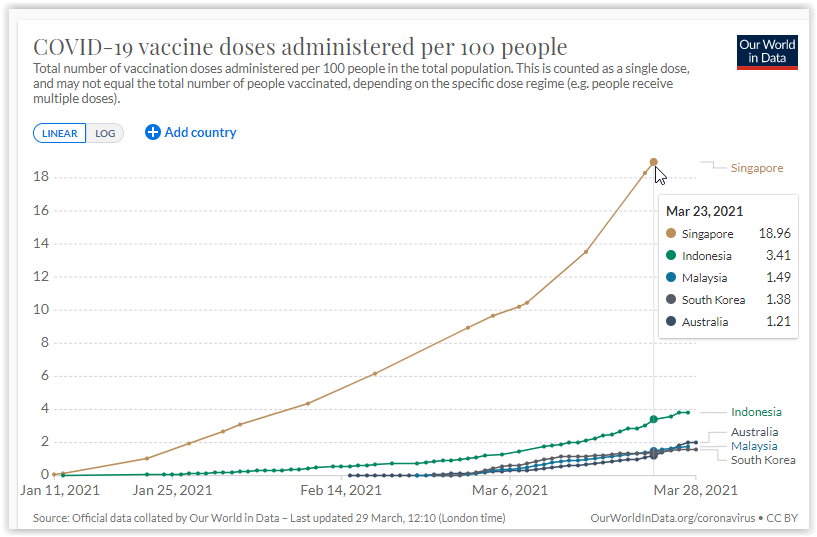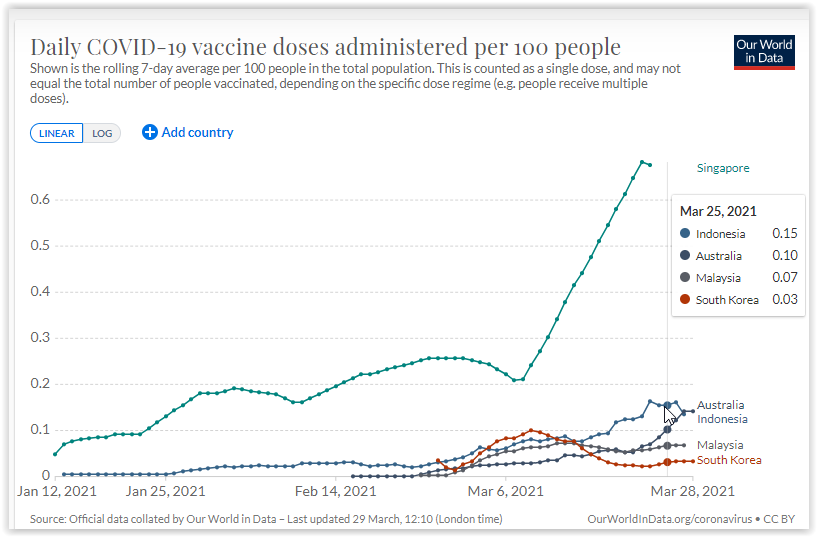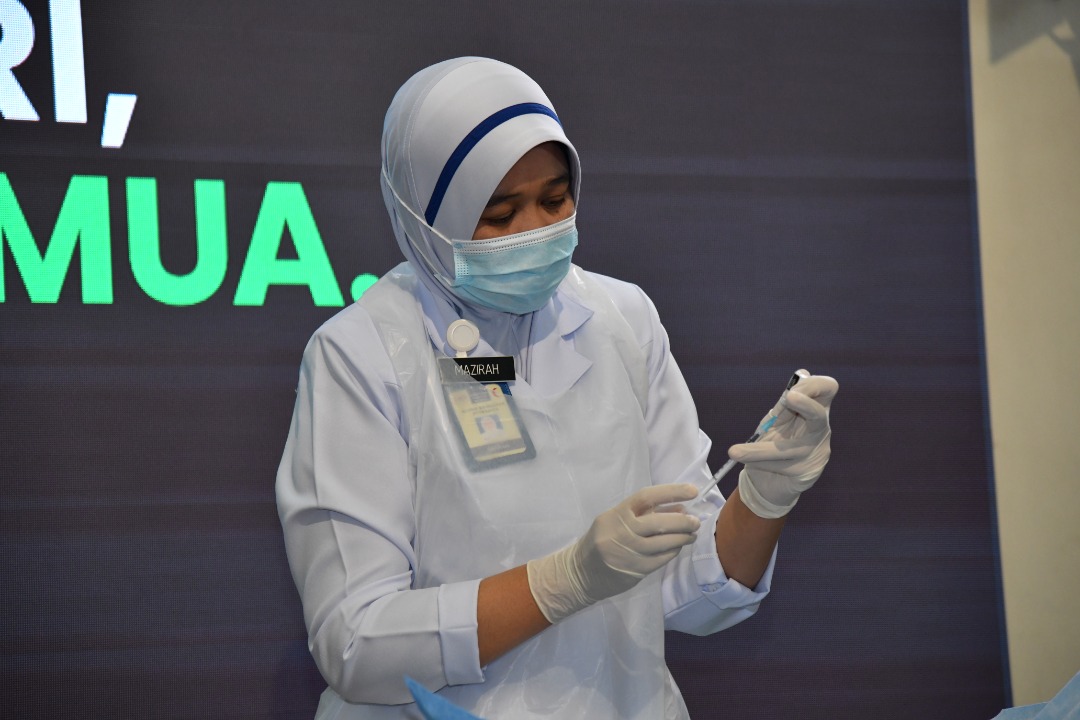Vaccine Minister Khairy Jamaluddin announced yesterday that Phase Two of the National Covid-19 Immunisation Programme (PICK), targeting over nine million senior citizens and people with underlying health conditions, will begin on April 19.
Only two million of Phase Two targeted vaccine recipients have registered under MySejahtera so far, comprising just 22 per cent of the government’s target. Hence, the Covid-19 Immunisation Task Force (CITF) will bring forward vaccination appointments from the general public who have already registered on MySejahtera into Phase Two.
According to Khairy, these early birds can expect appointments from next month or May itself. As of March 28, about 7.2 million people have already registered on MySejahtera for coronavirus inoculation, nearly 30 per cent of the adult population aged 18 and above.
While several lawmakers and medical practitioners have criticised Malaysia’s apparently slow Covid-19 vaccination rate compared to other countries, I am cautiously optimistic that our inoculation programme will quickly build up momentum in the next few weeks. My confidence, in part, is also due to Khairy’s and Health Minister Dr Adham Baba’s openness to answering tough questions posed by the media on PICK, unlike the previous carefully regulated press conferences by health authorities on the management of the epidemic.
The past month of Phase One vaccination for frontline workers has been a trial run of sorts for CITF to put into place the logistics of delivering Pfizer-BioNTech’s ultra-cold vaccine, preparing vaccination centres and storage sites, and gearing up human resources. Hence, it is rather unreasonable to expect Malaysia to immediately administer 75,000 or 160,000 daily shots-to-the-arm from the get-go.

According to Our World In Data, Singapore administered a total of 18.96 doses per 100 people as of March 23, followed by Indonesia (3.41), Malaysia (1.49), South Korea (1.38), and Australia (1.21). Australia overtook Malaysia as of March 27, administering 1.99 doses per 100 people compared to Malaysia’s 1.75 doses and South Korea’s 1.56 doses.
As for daily doses administered per 100 people on March 25, Indonesia administered 0.15 doses per 100 population, followed by Australia (0.10), Malaysia (0.07), and South Korea (0.03). Singapore administered 0.68 doses per 100 people on March 23. Australia and South Korea started their vaccine rollouts at about the same time as Malaysia.

So Malaysia seems to be doing okay. The real work starts with the general public, ie: high-risk groups, in Phase Two. Most of the targeted vaccine recipients in Phase One for frontliners in the health and security/ defence sectors are civil servants, hence they are readily identifiable by their employer, the government.
Nonetheless, Phase One of PICK does seem to have problems with private health care providers, as general practitioners (GPs), private dentists, and private hospital staff have complained about not even getting their first Covid-19 vaccine jab yet.
As Khairy says that vaccine registration of health care workers across the public and private health care system depends on listings by the Ministry of Health (MOH), perhaps MOH may consider using the Malaysian Medical Council (MMC) database that has the names and data of all registered medical practitioners in the country. MMC, after all, is chaired by the Health director-general himself.
The low vaccine registration rate by people most vulnerable to severe disease and death from Covid-19, less than a quarter just three weeks before the April 19 launch of PICK’s Phase Two, is more concerning. This appears to be a multi-faceted problem that does not only involve senior citizens’ unfamiliarity with the MySejahtera app, but also an apparent reluctance among the elderly to get vaccinated.
While expediting vaccinations of the willing general public in Phase Two is a logical measure, I am wary about the possible abandonment of vaccine-hesitant high-risk groups. Preventive health requires plenty of persuasion. Most Malaysians do not go for regular medical screenings, including mammograms and pap smears, even though women in general are more health-conscious than men.
The duality of Malaysia’s health care system – where public and private health care spending is nearly equal – also means that many Malaysians are not tied to a single primary health care provider, unlike in the UK where residents are registered with one GP for most care. Hence, in the UK, GPs send invitation letters to their patients for Covid-19 shots. Vaccination – whether for Covid-19 or a regular flu jab – is a primary health matter.
Knowing this, CITF should work much harder in registering people above 60, many of whom have underlying health conditions, for Covid-19 vaccination. CITF can’t do business as usual and must go to people directly, instead of waiting for people to turn up.
The government’s narrative about the Covid-19 epidemic must also change. Malaysia’s extremely low case fatality rate of 0.37 per cent, while laudable, has contributed to public complacency. The dearth of personal stories from families who lost loved ones to Covid-19, or even Malaysians who suffer from long Covid, also makes the virus appear less dangerous.
As Malaysia’s reported Covid-19 cases dropped to below 1,000 yesterday – on the back of a low positive rate, which lends some credibility to official figures – the government should resist claiming early success in managing the epidemic. Perhaps authorities should openly acknowledge what some public health experts believe – that Malaysia has long entered the mitigation phase with widespread community transmission of the virus.
When Phase Two opens on April 19, the government’s narrative must be – get vaccinated now, not later, because Covid is still around.

Boo Su-Lyn is CodeBlue editor-in-chief. She is a libertarian, or classical liberal, who believes in minimal state intervention in the economy and socio-political issues.








